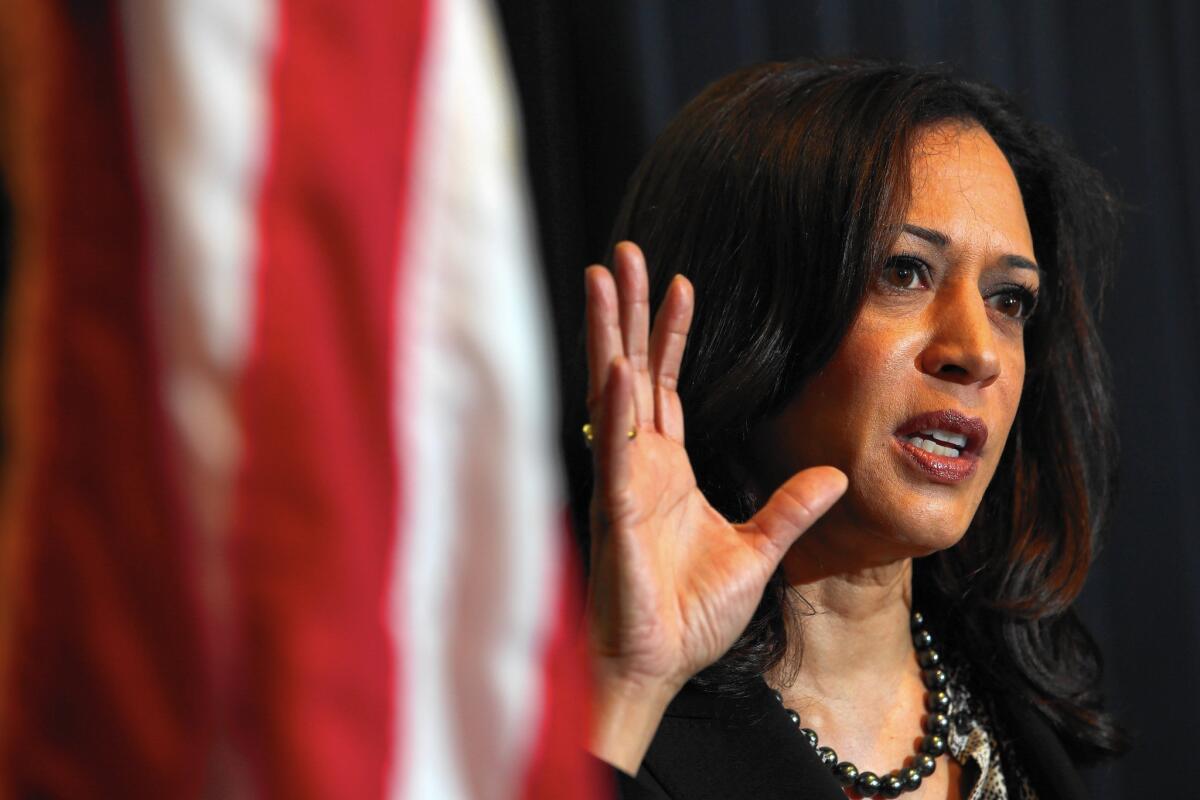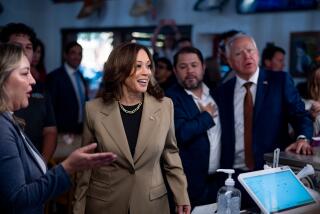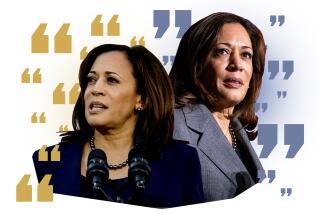Kamala Harris’ head start in Senate race may deter potential rivals

While former Los Angeles Mayor Antonio Villaraigosa and other potential candidates decide whether to enter the U.S. Senate contest, state Atty. Gen. Kamala D. Harris has been using her head start in the race in ways that could deter others from competing.
Harris jumped into the race days after Sen. Barbara Boxer announced she would not seek reelection in 2016. Harris almost immediately began rolling out endorsements from Democrats across the nation — including some from such big names as Sens. Elizabeth Warren of Massachusetts and Cory Booker of New Jersey. She has been holding fundraisers, including one Tuesday night in Sacramento, as well as regularly headlining official events.
------------
FOR THE RECORD
Feb. 4, 10:27 a.m.: An earlier version of this article misspelled Sen. Cory Booker’s first name as Corey.
------------
The attorney general post offers Harris a megaphone for promoting herself, one she used Tuesday morning at a Los Angeles news conference in a setting that resembled the White House press room, blue curtain backdrop and all.
She didn’t mention her campaign at the event, and refused to answer questions about it. Rather, before a half-dozen television cameras in the state’s largest media market, she touted her office’s successful prosecution of a San Diego man who posted naked photos of women on his websites and extorted money from them.
But policy can also be viewed as politics, and the built-in advantages an incumbent has can scare off potential rivals. The filing deadline for other candidates is more than a year away, but anyone considering a run must decide soon: Contribution limits in races for federal office are relatively low, requiring aggressive fundraising, and only those who have created candidacy committees can start collecting money.
“This is one case where it’s very literally true — time is money,” said Jack Pitney, a political science professor at Claremont McKenna College. Every day a potential contender does not enter the race, “they’re losing supporters to Kamala Harris and … losing an opportunity to demonstrate their viability.”
Asked about her Senate bid at the Los Angeles event Tuesday, Harris responded, “We’re in a state office building. And I’m not going to talk about politics now.”
But the political subtext of her public appearance was hard to miss. The venue was not the state capital or San Francisco, where Harris was district attorney for eight years, but Southern California — where she spent more than $1.2 million in reelection advertising last year despite the lack of a credible challenger. (Harris’ new husband lives in the area, and she also has been spending more time here.)
Los Angeles is also Villaraigosa’s home town. If he joins the race, Villaraigosa will instantly become Harris’ chief rival. And a top imperative for her will be to undercut him on his own turf.
Villaraigosa is the best known politician who is considering the race. Some members of Congress are also weighing bids, including Reps. Loretta Sanchez (D-Santa Ana) and Xavier Becerra (D-Los Angeles).
The early rush of support for Harris sparked consternation among some Latino lawmakers, who have grown increasingly vocal with worry that the fast-growing Latino electorate is being ignored by many Democratic leaders.
The California Latino Legislative Caucus on Tuesday argued that a Latino contestant in the Senate race would be a boon for all Democrats.
“There are many talented Latino leaders who could help energize Latino Democratic voters,” said the caucus’ vice chairman, Sen. Ben Hueso (D-San Diego).
Villaraigosa is said to be close to a decision about whether to run. Members of the caucus insisted they were not pushing for any particular candidate, despite the timing of their statements.
“One of the goals of the Latino Caucus is to develop avenues that empower the Latino community all across the state of California,” the caucus’ chairman, Assemblyman Luis Alejo (D-Watsonville), said in press release.
Last weekend at a political conference at UC Berkeley, questions about whether Democratic leaders had prematurely anointed Harris, before the field of candidates had emerged, were constant. Some in the party found that irritating, even sexist.
“I love this theory of a conspiracy, an anointment,” Shawnda Westly, the state Democratic Party’s executive director, said Friday.
“From my vantage point, I’m looking at a statewide elected official who has a strong electoral record … who has a national donor network and who is the only declared candidate and who is announcing endorsements that she has received,” Westly said.
“That is not a conspiracy. That is called effective campaigning. But I guess we only call it that when a man does it.”
Twitter: @LATSeema
Twitter: @finneganLAT
More to Read
Sign up for Essential California
The most important California stories and recommendations in your inbox every morning.
You may occasionally receive promotional content from the Los Angeles Times.












